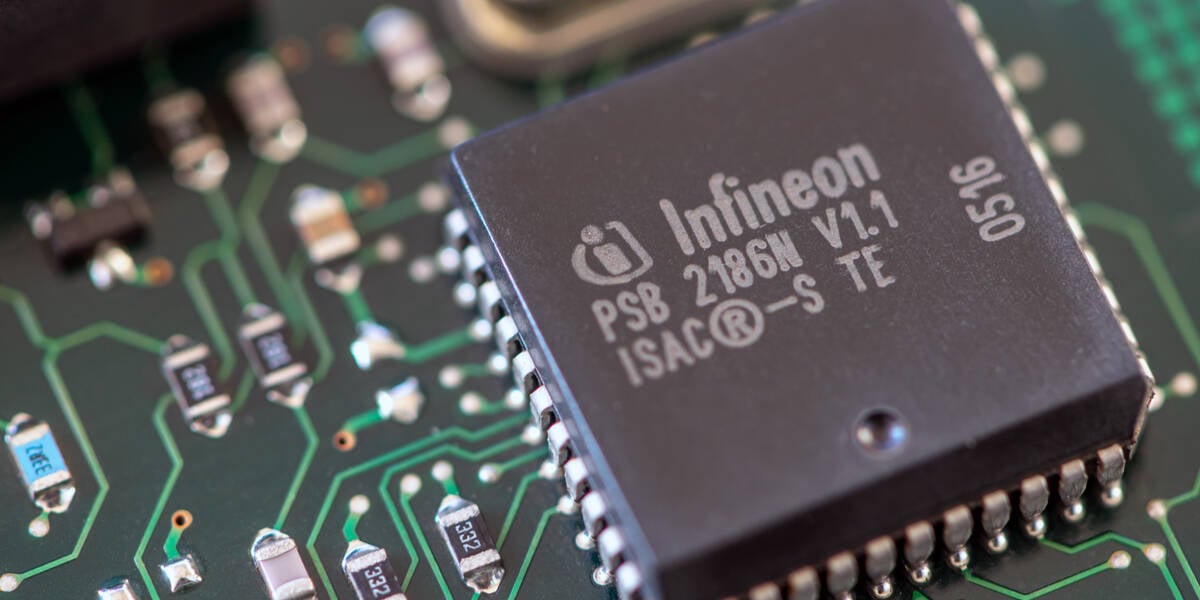Infineon More Than Doubles Profit As Semiconductor Shortages Persist

Infineon joined the ranks of chipmakers that are benefiting from the industry-wide global semiconductor shortages, more than doubling profits in a sector where lead times are severely protracted.
Formerly Siemens Semiconductor, the German-based company reported revenue of €3.298 billion ($3.48 billion), up 22 percent year-on-year for Q2 of fiscal 2022 ended March 31 [PDF]. Profit bounced 131 percent to €469 million ($494 million).
Jochen Hanebeck, CEO at chip giant, said in a statement that the business "continues to perform well within an increasingly challenging environment."
"Global uncertainties, in particular the war in Ukraine and the further course of the coronavirus pandemic, are placing stress on supply chains. At the same time, demand for our products and solutions continues to exceed supply significantly," he added.
Infineon is a major supplier to the automotive industry, one that has acutely felt the deficit in chip availability. This was due to inflexible supply chains operated by car manufacturers, which tuned production downwards in the early outbreak of COVID-19 and then struggled to recover capacity.
Carmakers are still scrambling for chips, with Volkswagen's chief finance officer saying last month that he expects underlying structural problems in the supply chain to not be resolved before 2024.
Others including General Motors, Volvo, and Jaguar Landrover said in February that a dearth of chips was costing them vital revenues.
At Infineon, the Automotive division grew 23.1 percent to €1.491 billion ($1.57 billion) during Q2, with the Industrial Power Control unit up 21.7 percent to €430 million ($453 million). Power & Sensor Systems was up more than 25 percent to €925 million ($975 million), and Connected Secure Systems grew 24 percent to €448 million ($472 million).
For the year, Infineon raised its 2022 guidance by €500 million ($526 million) to €13.5 billion ($14.33 billion), so clearly the good times are going to roll for some time for chipmakers.
- Why did automakers stall while the PC supply chain coped with a surge? Because Big Tech got priority access
- SiC move: STMicroelectronics banks on bringing power electronics material in house as electric cars rev up
- Power management IC shortage holding cars, laptops, hostage
- What does $9bn buy you? For Infineon, a Cypress hill of California semis
The semiconductor industry grew more than 26 percent in 2021 to $595 billion and 2022 looks to be a prosperous 12 months.
A string of companies have made auspicious starts to the year including chip brands AMD and Intel as well as lithography maker ASML.
Lockdowns in China haven't eased the production pressure on actual chip producers, with Texas Instruments and ST Microelectronics talking of lost sales recently. Meeting demand will be a challenge.
Gartner thinks the chip shortages have peaked but with semiconductor lead time stretched to 26.6 weeks in March, some will disagree. ®
From Chip War To Cloud War: The Next Frontier In Global Tech Competition
The global chip war, characterized by intense competition among nations and corporations for supremacy in semiconductor ... Read more
The High Stakes Of Tech Regulation: Security Risks And Market Dynamics
The influence of tech giants in the global economy continues to grow, raising crucial questions about how to balance sec... Read more
The Tyranny Of Instagram Interiors: Why It's Time To Break Free From Algorithm-Driven Aesthetics
Instagram has become a dominant force in shaping interior design trends, offering a seemingly endless stream of inspirat... Read more
The Data Crunch In AI: Strategies For Sustainability
Exploring solutions to the imminent exhaustion of internet data for AI training.As the artificial intelligence (AI) indu... Read more
Google Abandons Four-Year Effort To Remove Cookies From Chrome Browser
After four years of dedicated effort, Google has decided to abandon its plan to remove third-party cookies from its Chro... Read more
LinkedIn Embraces AI And Gamification To Drive User Engagement And Revenue
In an effort to tackle slowing revenue growth and enhance user engagement, LinkedIn is turning to artificial intelligenc... Read more

